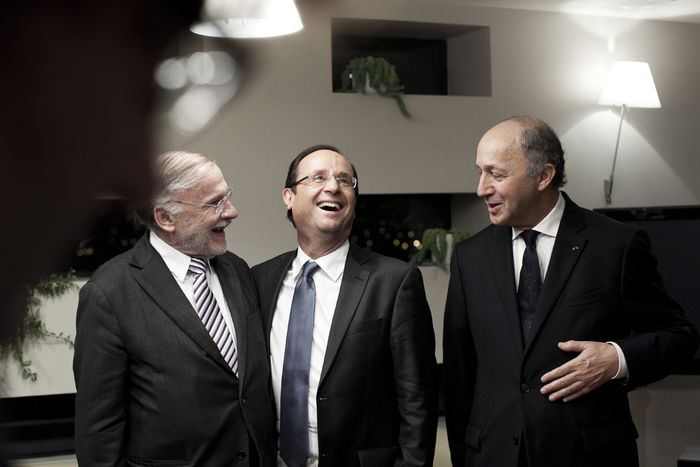
Europe still divides the Socialist party : Act II
Published on
On Tuesday November 6th, we will know the position of the Socialist party regarding the Reformed Treaty adopted in Lisbon. If the party keeps its answer secret, it is because for two years and since the failure of the referendum about the European Constitution, the European Union has become taboo.
Today, it is no longer the content that poses problem to some members of the Socialist Party but the form. Nicolas Sarkozy has indeed decided to ratify the Lisbon Treaty through parliament route. Only Jean-Luc Mélenchon could vote no, when others like Laurent Fabius are indignant about the fact that the new text will not be submitted to the vote of the French people.
Is the French Socialist party going to play again the tragicomedy, showing them fighting about the European issue in 2005? Nothing is less sure. François Hollande has understood this and for lack of compromise during the National Desk he decided to put off the decision for November 6th . First, the future former First Secretary had considered the abstention. But then, with the pressure of the yes supporters and by the shift of Vincent Peillon, who defended fervently the no two years ago, François Hollande has declared he will vote yes. He considered that “even if the text is not the one we would have negotiated”, it enables “to break Europe out of the impasse”.
The Socialist party faces a dilemma: How can they ratify the Treaty, without lining up with Nicolas Sarkozy who had succeeded, together with Angela Merkel, in making sure that everyone agrees? Today, members of the direction of the party, hostile to the ratification of the European Constitution in 2005, are aware that it would be problematic to maintain the same position. It would be difficult indeed to explain to the French people that the hard negotiations that led the countries and States leaders to adopt the Lisbon Treaty are still not going the right way.
Some people criticize the form only but no longer the content of the text. To that end, they use the engagement taken by Ségolène Royal during the presidential campaign to submit the new treaty to a referendum. This is the case of Laurent Fabius, leader of the no two years ago. He is now considering refusing to participate to the vote “in the current state of things”. The vote will take place in the parliament. By then, Laurent Fabius hopes to convince the socialist members to demand a new referendum to Nicolas Sarkozy. Nevertheless, he admits that some improvements have been made in the content of the treaty. For example, the creation of “a President of the European Union for two years and a half, and of a High Representative of Foreign Affairs”. However he regrets that the treaty does not mention anything “on the recovering of the social and fiscal situation of Europe (…) nothing concerning the monetary issue”.
Unlike Laurent Fabius, Vincent Peillon, another ex-leader of the no, has declared he will vote yes. He explains it in a text he publishes together with about fifteen deputies and senators from the New Socialist Party (NPS): “In 2005 we had called to vote no. We hoped to end up resuming the negotiations on the constitutional treaty in better conditions, what did not happen. Should the treaty fail this time, there won’t be another negotiation.” However, he intends to ask for the organisation of a new referendum. But what would be his decision if the Socialist Party called to vote yes, or if the President -what is likely to happen-refuses to give in?
Eventually, only those who were already partisans of the Constitution have not changed their mind. According to the former Minister of the European Affairs, Pierre Moscovici: “the treaty does not contain all the improvements for the citizens”. He also regrets that this text “does not allow a qualified majority voting concerning the fiscal and social issues, does not offer new energy or environmental competences.” But for him, “a steady President of the European Council, an assertive role of the National Parliaments, a President of the Commission elected during the European elections, a High representative of Foreign Affairs, a reference to the Charter of Fundamental Rights (…) are deciding improvements” leading to adopt the treaty.
As usual, nothing is simple in the Socialist party. François Hollande has declared he has taken note of Nicolas Sarkozy’s decision not to organise a new referendum, though he regrets it. But what if the President had decided the contrary? Would Laurent Fabius, Vincent Peillon and the others still be in favour of a new referendum?
All the ingredients are ready for Tuesday evening. With the rue de Solférino as stage, we will attend the second act of the division regarding the future of Europe, with François Hollande as producer. With all this entertainment, we could nearly forget that it is an important issue…
Elie Levaï / Translation : Manon Bertrand



